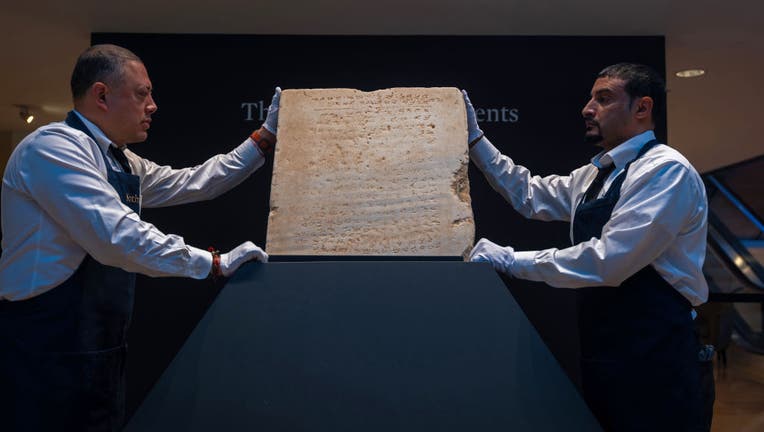Ancient Ten Commandments tablet to auction after decades in obscurity

The oldest known stone tablet inscribed with the Ten Commandments, dating from 300 to 800 A.D., is displayed at Sotheby's auction house on December 09, 2024 in New York City. (Photo by Spencer Platt/Getty Images)
NEW YORK - A late Byzantine period tablet inscribed with the Ten Commandments will go up for auction Wednesday, according to Sotheby's.
The auction will start for the artifact on December 18 at 10 a.m. EST.
According to Sotheby's, the tablet is "one of the most widely known and influential texts in history" and is approximately1,500 years old. It's also the "only complete tablet of the Ten Commandments still extant from this early era."
RELATED: Antioch pastor fights off alleged church burglar with martial arts
The tablet, which weighs 115 pounds and stands at two feet tall, is estimated to sell between $1 and $2 million, according to a press release.
"This is really one-of-a-kind. It’s one of the most important historic artifacts that I’ve ever handled," Sharon Liberman Mintz, Sotheby’s international senior specialist of Judaica, books and manuscripts, said to ARTnews.
According to FOX News, the tablet was first discovered in 1913 near Israel's southern coast during railway construction. For years, it went unnoticed and was used as a paving stone in front of a house, with its inscription facing regular foot traffic.

SCOTUS rules to protect religious accommodations
The Supreme Court used the case of a Christian mailman who didn?t want to work Sundays to solidify protections for workers who ask for religious accommodations. Andrew Lieb, a legal analyst with Lieb at Law, joined LiveNOW from FOX's Josh Breslow to break down the ruling.
In 1943, a scholar bought the stone and identified it as a Samaritan Decalogue, an important piece of religious history possibly displayed in a synagogue or private home. The original site of the tablet may have been destroyed during Roman invasions between 400-600 CE or during the Crusades in the 11th century.
RELATED: Texas State Board of Education approves school curriculum with Biblical references
The inscription on the stone includes 20 lines closely related to Biblical texts familiar to both Christians and Jews.
The tablet notably contains only nine of the Ten Commandments, leaving out "Do not take the Lord's name in vain" and instead adds a command to worship on Mount Gerizim, a sacred place for Samaritans.

